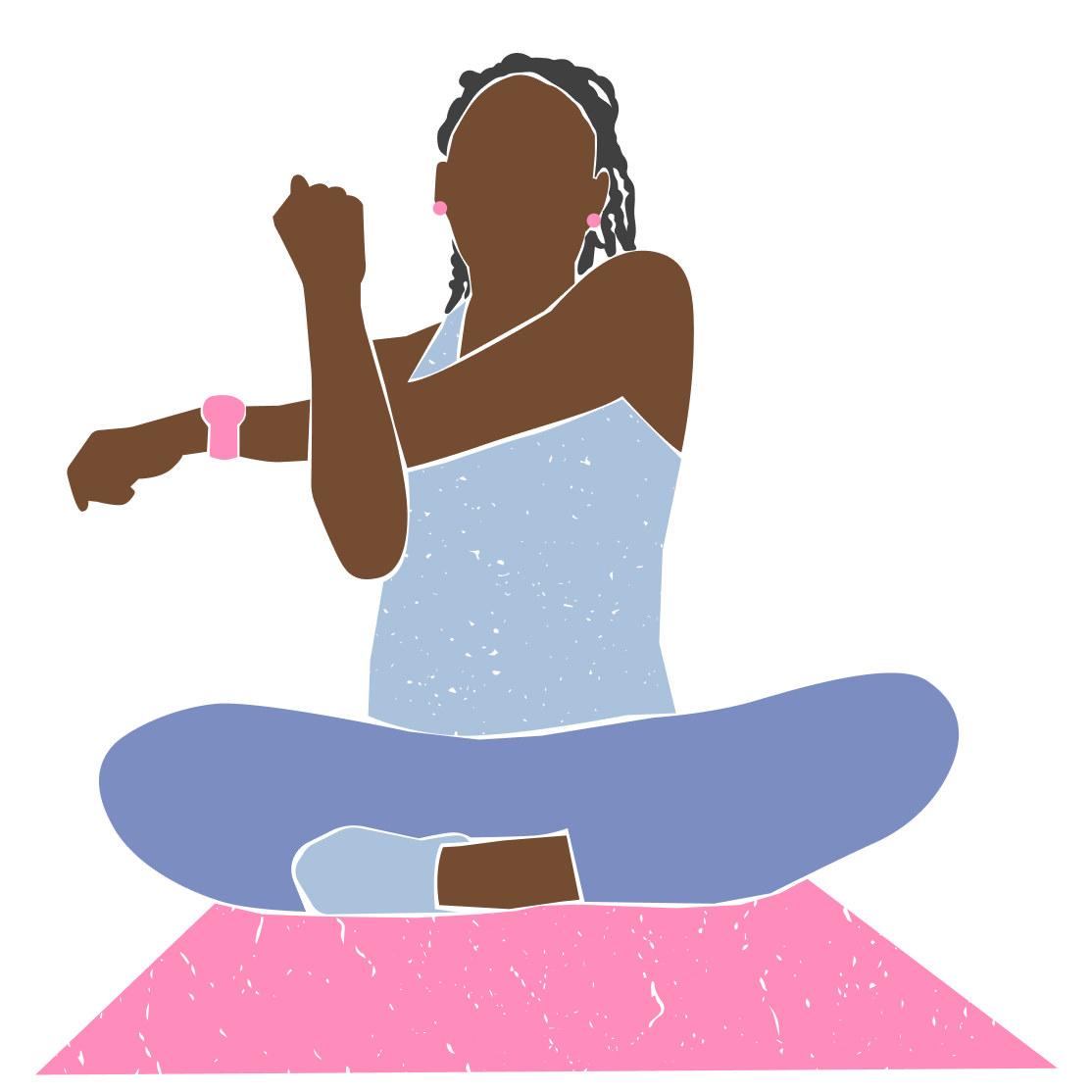You’re red and flushed, you’re sweaty, you’re drenched, you’re chilled...it's a hot flash! One of the most common symptoms of menopause, hot flashes affect nearly 8 out of 10 women in midlife. They’re uncomfortable, they’re stressful, and they can make you do way more laundry than you ever wanted. If you want to learn how to stop hot flashes fast (and who doesn't?), you've come to the right place. Our comprehensive guide includes lifestyle changes, holistic remedies, and prescriptions that can help you keep your cool. Because, at Midi, we don't believe in suffering through menopause symptoms. We're all about finding solutions, so you can feel better faster.
That feeling when warmth whooshes from your chest to your face is disruptive enough. The sweating and red, flushed face is bad enough. But what’s worse is how unpredictable and sudden hot flashes can be. They’re frustrating, life-altering, sleep-disrupting, and confidence-zapping, and we all want to be able to learn how to stop hot flashes fast. From natural and lifestyle-based interventions to hormonal options, here’s how to cool down a hot flash when it hits—and the long-term therapies that reduce their frequency and severity.
What Are Hot Flashes, and When Do They Start?
A hot flash is defined as a sudden, intense sensation of heat in the face, neck, and chest that may also cause sweating, chills, anxiety, and a rapid heartbeat. They can range from mildly bothersome to severe, disrupting your work and daily activity. If hot flashes happen when you’re sleeping, they’re called night sweats. As for when do hot flashes start? Flushes often begin in perimenopause, and for some women, they can last well into postmenopause.
They can show up in subtle ways, too, like only in the days leading up to your period or after a glass of wine. It could just be a general feeling of “running warmer.”
How Long Do Hot Flashes Last?
Here's the thing: hot flashes are like snowflakes—no two experiences are exactly alike. Hot flashes can be short and quick or the drawn-out “Is this over yet?!” variety, lasting from 30 seconds to up to 10 minutes. (On average a hot flash starts and passes in 5 minutes.) Unfortunately, there’s no way of telling you what your hot flashes will be like, as the experience differs among women. Some women have a few hot flashes each week, while others will brace themselves for 10 hot flashes per day. On average, women have hot flashes for 1.2 years.
So, next question: How to stop hot flashes fast? We’ve got you covered in terms of quick cooldown strategies, relaxation techniques, medical therapy, and more. Feel free to take the list, try it out, keep what works for you, and ditch what doesn’t. The result: your personalized hot flash toolkit.
Quick Cooling Techniques for Immediate Relief
Picture this: A hot flash takes you by surprise. One minute, you're calm, cool, and collected; the next, you’re red and sweaty like you just sprinted in a 5K in 90-degree heat. Here are the fast-acting steps you can take:
Instant Cooling Tips
Cold is your number one friend in this moment:
- Fill up a glass of cold, icy water and have a long drink.
- Apply cool compresses (like a cooling pad or towel) to your neck or chest.
- Take off extra layers. (Dressing in cool, breathable fabrics also helps.)
- Spritz on a cooling body/face spray.
Environmental Adjustments
No need to try to survive in the heat. Here’s how to drop the temp in your surroundings:
- Go outside if it’s cooler than your office/home.
- Turn down the thermostat and sit quietly in a cool room.
- Turn on a desk fan and direct it at your face or wear a cooling neck fan.
Fast-Acting Breathing and Relaxation Techniques
A hot flash is known to trigger anxiety, which can have the added bonus (sarcasm!) of increasing your heart and breathing rate, compounding the feeling of being overheated. These strategies can help you slow down your nervous system:
Paced Breathing
Paced breathing is a type of breathwork where you take slow, deep, diaphragmatic breaths. (To do this, make sure your belly fills up with air on the inhale. Make your exhale longer than your inhale.) In one study, women who had, on average, 8.5 hot flashes per day were instructed to use a portable, guided breathing device to slow their breathing to less than 10 breaths per minute for 15 minutes every day. After 12 weeks, those who practiced paced breathing had about a 20% reduction in hot flashes per day. Slow breathing reduces activity of the sympathetic (fight-or-flight) nervous system and creates a sense of relaxation.
Mindfulness and Quick Relaxation Methods
When you’re having a hot flash, it’s natural to feel panicky, especially if one hits you at an inopportune time, like during work at the office, at your kids’ basketball game, or on a date. Mindfulness has been shown to be effective in improving coping ability and reducing the distress associated with menopausal hot flashes.
Dietary Changes to Quickly Reduce Hot Flashes
Certain foods are triggers for hot flashes. Of course, every woman responds differently to dietary factors, so you’ll want to play close attention to what foods tend to make your flashes worse. Here are some of the biggest culprits:
- caffeine (coffee, tea, energy drinks)
- alcohol
- hot drinks
- spicy foods
- ultraprocessed foods
Instead, make hot flash–friendly swaps. For example, go for iced herbal tea or a fruit- or cucumber-infused water over hot caffeinated tea. Explore booze-free options like nonalcoholic wine, beer, and canned cocktails. Focus on a balanced diet that prioritizes whole foods like fruits, vegetables, lean proteins, and whole grains.
Nonhormonal Supplements and Remedies for Fast Relief
Despite having fans and cooling towels at the ready or switching out a sparkling wine for sparkling water, you may still find hot flashes to be unreasonably bothersome, which means it may be time to chat with a healthcare professional.
Along with the above lifestyle adjustments, a healthcare professional, like a Midi clinician, may also recommend adding an herbal supplement into your Care Plan. Some supplements may reduce hot flashes, such as:
- black cohosh (a flowering plant native to North America)
- Siberian rhubarb (a root extract of rhapontic rhubarb)
- maca (a root vegetable that grows in Peru)
- soy isoflavones (phytoestrogens found in soy)
At Midi, these recommendations will be curated to you depending on the other menopause symptoms you’re experiencing, since these herbal supplements have the potential to help in multiple domains. What’s more, all supplements recommended will be third-party tested for safety.
True Stories of Transformation
Medical Treatments for Fast and Effective Hot Flash Relief
Hot flashes affect about 75% of women during the hormonal transition, and while many women can use lifestyle adjustments to manage mild hot flashes, moderate to severe hot flashes may benefit from medical treatments like prescription hormonal and nonhormonal medications.
Hormonal Medications to Treat Hot Flashes
Hormone replacement therapy (HRT), also known as hormone therapy or menopause hormone therapy, is an FDA-approved first-line treatment, according to The Menopause Society. Past research has found that hormone therapy decreases the weekly frequency of flashes by 75%, compared with a placebo.
In addition to hot flashes and night sweats, these prescription medications can also treat the genitourinary symptoms of menopause (such as vaginal dryness and incontinence), making it an effective overall treatment for some of the most common menopause symptoms. What’s more, hormone therapy has also been found to improve quality of life and improve bone density.
Despite the benefits and safety of hormone therapy, also called hormone replacement therapy (HRT), it’s not right for every woman.
Nonhormonal Remedies for Hot Flashes
Other nonhormonal drug treatments have also been shown to reduce hot flashes, including:
- Selective serotonin reuptake inhibitors (SSRIs) and serotonin-norepinephrine reuptake inhibitors (SNRIs) are two types of medications frequently prescribed for depression, but they can also be effective for hot flashes. Research shows that some of the drugs in these classes can reduce hot flashes by as much as 50%.
- Fezolinetant, gabapentin and pregabalin, and oxybutynin (typically used for overactive bladder) are other effective nonhormonal prescription treatments for hot flashes.
Lifestyle Adjustments to Reduce Frequency and Severity
What helps with hot flashes? A healthy lifestyle. If there’s one true fountain of youth, it’s exercise. And that can be counterintuitive when it comes to hot flashes. After all, how can something that makes you hot and sweaty help stop you from being…hot and sweaty?
Exercise has multiple side benefits, such as improving sleep, reducing stress, and boosting your mood, all of which can have a positive effect on body-temperature regulation. Women who perform aerobic and resistance training exercise say they experience fewer hot flashes, per research. Physical activity encourages your body to dissipate heat by sending blood flow to the skin and triggering sweating. With regular exercise, your body becomes more effective at cooling itself down, even at lower temperatures, something that can help prevent future hot flashes.
In addition to regular exercise, plan other de-stressing activities. This stage of life can be pretty harrowing when you factor in work, caretaking responsibilities, house, financial stuff, relationships, and so on. When you feel more stress, you’re more likely to be bothered by menopausal symptoms. Here’s where any number of de-stressing practices come into play, like:
- a regular yoga practice
- daily meditation or mindfulness
- deep breathing
- progressive muscle relaxation
- good bedtime hygiene habits for good sleep
Also consider mental health treatments. Cognitive behavioral therapy, in which you identify how your thoughts and behaviors may contribute to hot flashes and develop coping skills and other strategies to change these unhelpful patterns, may reduce frequency of symptoms by 25%. Weekly hypnosis can cut flash frequency by up to 55% (though finding a trained therapist in your area can be tricky).
When to Talk with Your Healthcare Professional
With so many options for hot flash treatment, there’s no reason you need to stick with your hot flashes until they go away—something that can take years. Even if you’re convinced your hot flashes are in the “mild” category, you can still benefit from creating a care plan with a clinician who can work with you to identify lifestyle strategies that are doable and effective for you.
For moderate or severe hot flashes that impact your quality of life, a comprehensive plan that combines lifestyle support, herbal supplements, and prescription hormonal or nonhormonal medications may be needed to bring you daily comfort. A menopause-trained professional, like one at Midi Health, can meet you with empathy and clinical guidance and help design personalized menopause support for you.
Key Takeaways
- Hot flashes affect about 75% of women during perimenopause and menopause. Hot flashes at night are called night sweats.
- Hot flashes can last anywhere from 30 seconds up to 10 minutes; some women have a few hot flashes each week, while others experience 10 hot flashes per day.
- Hormone replacement therapy (HRT) is an FDA-approved first-line treatment, according to The Menopause Society. Past research has found that hormone therapy decreases the weekly frequency of flashes by 75%, compared with a placebo.
- There are several nonhormonal treatments that are effective at reducing the frequency and severity of hot flashes and night sweats.
- Lifestyle changes, like modifications to diet, regular exercise, and breath work, can also stop hot flashes fast.
Frequently Asked Questions (FAQs)
How do you stop hot flashes immediately?
If you’re having a hot flash right now, remove clothing layers (if you can) and seek out cool temperatures (decrease the thermostat, go outside, or turn on a fan). Next, calmly sit down and sip on a glass of iced water. Take slow, deep breaths until you start to feel better.
What helps hot flashes naturally?
Numerous holistic options have been shown to help reduce the severity and frequency of hot flashes, including cognitive behavioral therapy, hypnosis, dietary changes, regular exercise, and relaxation techniques, as well as certain herbal supplements like black cohosh.
Can you take anything over-the-counter for hot flashes?
Certain over-the-counter herbals like black cohosh or maca may be recommended for you. In addition, vitamin E, vitamin D, and omega-3 fatty acids may be worth taking, especially if you’re deficient in vitamin D or avoid food sources of omega-3s like fish and seafood. Talk with your clinician before taking over-the-counter supplements to make sure they’re a recommended part of your care plan, and make sure to buy third-party-tested products to ensure safety and purity.
How to sleep through hot flashes?
Hot flashes at night are called night sweats, and waking up drenched in sweat is incredibly disruptive to sleep. Wearing breathable sleepwear, using cooling sheets and pillows, taking extra blankets off your bed, and turning on a fan can help you stay cool at night. Decreasing alcohol consumption at night can also decrease hot flashes. If you wake up from night sweats, drink a cool glass of water, take off any covers, change your pajamas if they’re wet or damp, and place cool compresses on your face or neck, if needed.
Does drinking water reduce hot flashes?
Drinking icy, cold water is one way to help your body cool down, which can help dissipate a hot flash. Make sure you’re sitting in a cool room; calmly sipping the iced water until your body temperature regulates.
If you’re in perimenopause or menopause and want guidance from clinicians who specialize in women’s midlife health, book a virtual visit with Midi today.
Hormonal change is at the root of dozens of symptoms women experience in the years before and after their period stops.
Our trained menopause specialists can help you connect the dots to guide you towards safe, effective solutions.
Whether you need personalized guidance or a prescription routine to tackle symptoms—including brain fog, hot flashes, sleep trouble, mood swings, and weight gain—we’ve got you covered. Learn more here.
Midi’s mission is to revolutionize healthcare for women at midlife, wherever they live and whatever their health story. We believe that starts with education, to help all of us understand our always-changing bodies and health needs. Our core values guide everything we do, including standards that ensure the quality and trustworthiness of our content and editorial processes. We’re committed to providing information that is up-to-date, accurate, and relies on evidence-based research and peer-reviewed journals. For more details on our editorial process, see here.








